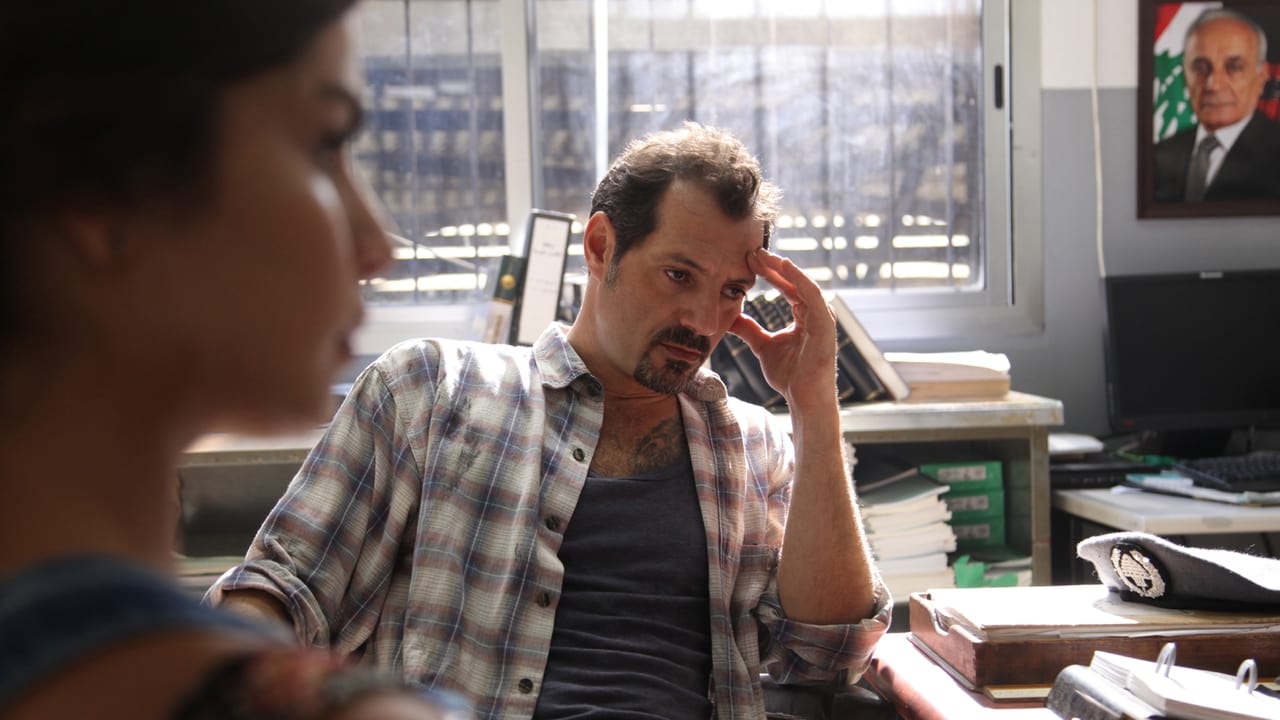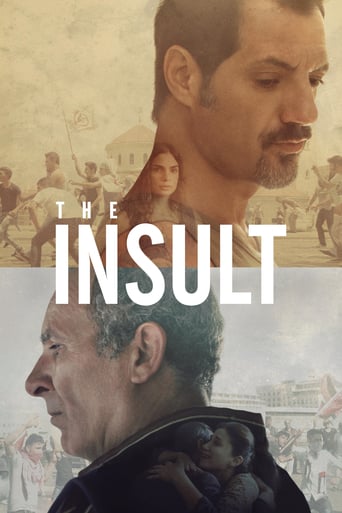

A Brilliant Conflict
... View MoreThe performances transcend the film's tropes, grounding it in characters that feel more complete than this subgenre often produces.
... View MoreA film of deceptively outspoken contemporary relevance, this is cinema at its most alert, alarming and alive.
... View MoreActress is magnificent and exudes a hypnotic screen presence in this affecting drama.
... View MoreBrilliant script, visual story-telling, and cast. Adel Karam, Kamel el Basha and Rita Hayek, among others, give outstanding performances. From his debut with West Beirut, Doueiri has proven a great cinema maker. Lila ça dit was another marvelous work. I only lament that his films are so few and far between, no doubt due to funding challenges.
... View More"I wish Ariel Sharon wiped you all out" Tony (Adel Karam)Tony, a Lebanese Christian, shouts this insult at Yassar, a Palestinian refugee, that, together with the epithets Yassar had called to him, prompts a court proceeding in diverse Beirut, creating a national interest and hatred that would foment.The half million Palestinians in Beirut and the multiple sects of Christians are not going to be appeased by any court decision that doesn't support their cause. Consequently writer/director Ziad Doueiri and writer Joelle Touma, both responsible for the stunning The Attack (2012), craft a heavily figurative and entertaining courtroom drama that clearly and forcefully lays out the history and contemporary contempt of Lebanese and Palestinians. The proceedings also emphasize the humanity that underlies the conflict.The two principals are very different men: Tony is a garage mechanic and owner, a hothead with a big chip on his shoulder about Palestinian incursions (no mention here about the currently millions of Syrian refugees); Yassar is an engineer, seemingly even tempered, who heads a team of workers charged with fixing buildings that need to be up to code.Both men have reasons to hate each other in circumstances that require a careful treatment by the justices. With the two men, there is no nuance or subtlety. With the court, empathy and rationality are required. Throughout, the filmmakers allow us to enjoy the legal jousting while gaining sympathy for both sides of the ethnic animus.The dynamic Insult deserved every bit of its Oscar nomination for best foreign language film. While some might complain the treatment is simplistic and Tony too headstrong, it's still powerful cinematic drama and respectful of the differences that make wars."Insults are the arguments employed by those who are in the wrong." Jean-Jacques Rousseau
... View More"The Insult" (2017 release from Lebanon; 112 min.) brings the story of Tony, a Christian Lebanese, and Yasser, a Palestine refugee and long-time resident of Lebanon. As the movie opens, we see Tony at a rally of the Christian party in Beirut. When Tony gets back home, he spends time with his highly pregnant wife Shirine. Them by accident, and resulting from a faulty drainpipe on his balcony, he wets Yasser, a foreman in a construction crew that is repairing buildings in the neighborhood. One thing leads to another, and Yasser calls Tony a "f---ing prick". Tony is outraged, and decides to pursue the matter. At this point we are 10 min. into the movie, but to tell you more of the plot would spoil your viewing experience, you'll just have to see for yourself how it all plays out.Couple of comments: this is the latest movie from accomplished Lebanese writer-director Zid Doueiri, who previously has brought us excellent films like 2012's "The Attack". Here Doueiri brings another heavily politicized tale that pushes all the right buttons, this time pitting Arabs against Arabs. I must admit that I wasn't really aware of this, but if we believe what Doueiri portrays in this film, there is a deeply-seeded resentment within the Lebanese Christian community against the many Palestinians what have over the years crossed into Lebanon and settled there. Central to the film are the long court proceedings that eventually take place between the two protagonists. I shan't say much more (biting my lip)! But I will say this: the movie flies by in no time. When the Best Foreign language Oscar nominations were recently accounted, I was a bit surprised to see that this was nominated. Now that I have seen the film, I can't help but feel whether this was nominated more for political reasons that for pure artistic reasons. Not to imply that "The Insult" is not a good movie, but in my humble opinion there are other foreign language movies from last year that seem to be more deserving, such as "Thelma" (from Norway). "B.P.M." (from France), or "The Commune" (from Denmark), just to name those."The Insult" opened in early February at my local art-house theater here in Cincinnati, and I couldn't wait to see it. The Super Bowl Sunday matinee screening where I saw this at was attended very nicely, somewhat to my surprise. Glad to see there seems to be a strong interest for this! If you are in the mood for a highly charged and political drama that pits Christian Arabs against Palestine Arabs, you cannot go wrong with this, so I encourage you to check out "The Insult", be it in the theatre, on VOD, or eventually on DVD/Blu-ray, and draw your own conclusion...
... View MoreThe original Lebanese title, "Case No. 23," plays to the domestic audience because it emphasizes the courtroom drama. That's the personal story. The English translation works better for the international audience. The broader reference suggests the film's application to the whole of the warring Middle East. That society is so obsessed with honour that it is paralyzed by any "Insult," real or perceived. The Palestinians' shame at the Naqba, their failure to have prevented the creation of Israel, still prevents their negotiation of a peaceful coexistence. Israel hovers at the margin here, cited as the Arabs' common demon. Ariel Sharon is a curse. The Palestinians' ultimate insult is to declare the Christian Arab a Zionist - or at least, an enabler of Israel. The film's central insults are exchanged by a Christian Arab mechanic, Tony, and a Palestinian refugee, construction foreman Yasser. Their war starts small enough: Tony has an illegal pipe, which soaks Yasser. After insulting Tony Yasser repairs the pipe, which Tony smashes. Both heroes find our understanding. The Palestinian may be given the greater sympathy and he's played as a more thoughtful, flexible figure. But the revelation of the Christian Tony's past enhances his character too. Both men prove victims of their respective people's history. For both, their history tempts them to blame all their own failure son that unfortunate history and their old enemy. The two trial scenes are superb drama. In each the magistrate conducts an intensive, searching examination of the case. The first bogs down when neither the plaintiff nor the accused stoops to repeat the insult that prompted Yasser's attack. The second trial reaches the same conclusion but with more satisfactory effect. Indeed, the losing side now seems as satisfied with the verdict as the winner. That's because Tony has had his story told too, his anger and indignation explained in context. In the lawyers' summary, each makes the other's case. The antagonism turns into understanding. Apart from the trials, the principals' true reconciliation happens in two scenes outside the court, before the verdict. In the first Tony casually helps his enemy restart his car. In the second, Yasser baits Tony into punching him, so he goes into the court with his own aching pair of ribs. An eye for an eye, a rib for a rib. At the end, after all the screaming, indignation and violence, the reconciliation is the men's silent, long-distance lock of the eyes. Both heroes - and their respective gangs of followers - carry the weight of history. Both have suffered violence, prejudice, victimization, which their self-respect challenges them to remember. Both men suffer increasing and increasingly harsh consequences for their intransigence. The film's message is the need to acknowledge the historic conflict, to recognize the long period of inhumane abuse, but to turn the page, to move on, to find a way to make a mutually respectful peace. Again, the implication is that this message extends beyond the film's conflict between Palestinian and Christian to include the Jewish state as well. There's an additional frisson when Yasser's lawyer is revealed to be Tony's more famous lawyer's daughter. This generational tension replays the theme of moving on from the past. Both the woman lawyer and the woman chief judge tacitly personify the new Middle East, the emergence of empowered womanhood in that archly patriarchal society.
... View More